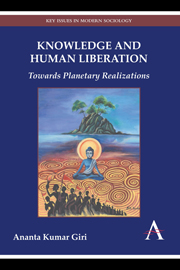Book contents
- Frontmatter
- Contents
- Preface
- Acknowledgments
- Foreword
- Introduction: The Calling of Transformative Knowledge
- Part I Nurturing the Garden of Transformational Knowledge: Roots and Variants
- Part II Rethinking Knowledge
- Part III Aspirations and Struggles for Liberation: Towards Planetary Realizations
- 12 Rethinking the Politics and Ethics of Consumption: Dialogues with “Swadeshi” Movements and Gandhi
- 13 Swaraj as Blossoming: Compassion, Confrontation and a New Art of Integration
- 14 Civil Society and the Calling of Self-Development
- 15 The Calling of Practical Spirituality: Transformations in Science and Religion and New Dialogues on Self, Transcendence and Society
- 16 Spiritual Cultivation for a Secular Society
- 17 Cosmopolitanism and Beyond: Towards Planetary Realizations
- Afterword
- Advance Praise
15 - The Calling of Practical Spirituality: Transformations in Science and Religion and New Dialogues on Self, Transcendence and Society
from Part III - Aspirations and Struggles for Liberation: Towards Planetary Realizations
Published online by Cambridge University Press: 05 May 2013
- Frontmatter
- Contents
- Preface
- Acknowledgments
- Foreword
- Introduction: The Calling of Transformative Knowledge
- Part I Nurturing the Garden of Transformational Knowledge: Roots and Variants
- Part II Rethinking Knowledge
- Part III Aspirations and Struggles for Liberation: Towards Planetary Realizations
- 12 Rethinking the Politics and Ethics of Consumption: Dialogues with “Swadeshi” Movements and Gandhi
- 13 Swaraj as Blossoming: Compassion, Confrontation and a New Art of Integration
- 14 Civil Society and the Calling of Self-Development
- 15 The Calling of Practical Spirituality: Transformations in Science and Religion and New Dialogues on Self, Transcendence and Society
- 16 Spiritual Cultivation for a Secular Society
- 17 Cosmopolitanism and Beyond: Towards Planetary Realizations
- Afterword
- Advance Praise
Summary
One conceives of truths not in terms of correspondence or satisfactions but as the pursuit of an ideal value which humanity tries to realize in and through time. The notion of transcendence enters just at this point to make the human seeking in and through time for an ideal or value which can never in principle be actualized or realized in time, however long we may conceive it to be. The idea of “transcendence” gives the seeking a “unity” which it would never have because of the very nature of “unendingness” of time on the one hand and of the “seeking” in it and through it, on the other.
—Daya Krisna, “Time, Truth and Transcendence” (1999, 324)Sita's Kitchen is the entire field of her self-imaging Shakti, powerfully represented by the earth. It is on earth, in the embrace of the Divine Mother, that all are born, all creatures great and small; all forms manifest, noble or evil; and all are nourished… The truth of Rama is the truth of advaita, non-duality, the truth of singular self-consciousness and its cinematic field of self-imaging Shakti which is Samsara… Annihilationism (the readiness to destroy all life and civilization on earth) is the highest stage of development of dualism… Dualism is the conviction that self and not-self are everywhere pitted against one another.
—Ramachandra Gandhi, Sita's Kitchen: A Testimony of Faith and Inquiry (1993, 16, 18, 20)- Type
- Chapter
- Information
- Knowledge and Human LiberationTowards Planetary Realizations, pp. 249 - 264Publisher: Anthem PressPrint publication year: 2013

